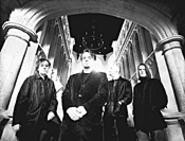If all that's true (and, if nothing else, Wilson probably believes it is), then why does Porcupine Tree sound so entrenched in the recent past? The first thing one notices about the band's latest album, Deadwing, is how deeply indebted it is to the sounds of the early- to mid-'90s, when bands like Soundgarden and Jane's Addiction were competing for the airwaves with rockers of a previous generation. The opening title cut floats by with an arcing guitar solo and subdued vocal presence that's pure post-Roger Waters Pink Floyd. This is followed by "Shallow," the album's first single, which is built around a riff that the Stone Temple Pilots would have killed for. And the way "Mellotron Scratch" goes from strummed acoustic guitar to Big Bad Riff is total post-grunge arena rock -- the kind of stuff every also-ran from Candlebox to Bush traded in.
This sort of pastiche persists throughout the disc, with the piano-driven "Lazarus" sounding like a mix of Coldplay and the mostly forgotten psychedelic popsters of Jellyfish. (Wilson says that he's heard of the band, but has never actually heard its music -- he cites Skylarking-era XTC as a big influence, though.) The album's next-to-last track, "Glass Arm Shattering," successfully struggles out from under its OK Computer-era Radiohead feel by adding "sha-la-la" background vocals. But make no mistake, Deadwing's all-over-the-place effect doesn't make it a bad album -- it's a very good, albeit disjointed record from a band that's made a name for itself by both confounding and delighting fans of progressive rock for more than a decade.
Deadwing's scattershot approach isn't helped by the fact that Porcupine Tree hasn't always been a band. The group started out as a project, entirely the vision of guitarist-singer Wilson. To begin with, all he had was the name; he invented a history and discography for a fictitious band before deciding that maybe he should actually record some music. Porcupine Tree's early records bound it to the U.K.'s psychedelic scene, where the band found itself lumped in with dirty hippies like the European phenom Ozric Tentacles.
The broad, shape-shifting Porcupine Tree aesthetic has always incorporated whatever sounds Wilson was interested in at the moment -- the almost trance-techno elements on the Orblike Voyage 34 are one example, but even that disc looked backward, sampling dialogue from a 1960s album about LSD use. The band's last three records have been steps toward embracing the music of the present day: Porcupine Tree, circa 2005, makes a very accessible blend of prog and hard-alternative rock. Sometimes almost cartoonishly rifftastic, but also expansively melodic, Deadwing is the apotheosis of this trend in the group's sound, and it brands Porcupine Tree as a maker of intricate, high-quality rock.
If you believe Steven Wilson, though, the transition to an overtly radio-friendly big-rock sound is deliberate, from an artistic standpoint -- and totally accidental, from a commercial point of view.
"Nothing in this band is ever conscious," he says emphatically. "We've always made music very much for ourselves, and anything that's happened in terms of attracting a fan base has been coincidental. Every album is an evolution in the band's sound, and this one is no exception. But around three albums ago, I started to get more interested in songwriting again, and less interested in long guitar solos and instrumental blowouts. I guess that was just a consequence of my listening diet. I got more into the idea of writing great songs, and so that became a part of the band's sound. And then a couple of albums ago, I got really into heavy death-metal stuff, so that began to creep more into the band's sound as well."
That side trip into metal -- specifically, Wilson's friendship and collaboration with Swedish art-thrash master Opeth -- is one of the more interesting aspects of the Porcupine Tree saga. Wilson produced Opeth's last three albums and greatly regrets that scheduling conflicts prevented him from working on the band's upcoming disc. By getting behind the board, he assisted Opeth leader Mikael Akerfeldt in achieving his dream of a symphonic-rock sound in a metal context. In return, Wilson was turned on to the virtues of aggression, which manifests itself in Deadwing's more savage passages. (Akerfeldt contributes a guitar solo to "Arriving Somewhere but Not Here" on Deadwing and sings harmony vocals on two other tracks.) While nothing on the disc approaches the brutality of Opeth's Deliverance, there is certainly a joy in the power and glory of the riff that would surprise anyone who'd heard an early Porcupine Tree release before picking up the new one.
With all this in mind, it's easy to give Wilson the benefit of the doubt when he describes his band's career arc as nothing but "a reflection of my own musical tastes and my own experiences." He seems genuinely surprised, at times, at how far he's taken Porcupine Tree. "Luckily, it's gone in the right direction, in the sense that more people seem to like it, rather than less," he says. "But it could easily have gone the other direction."












